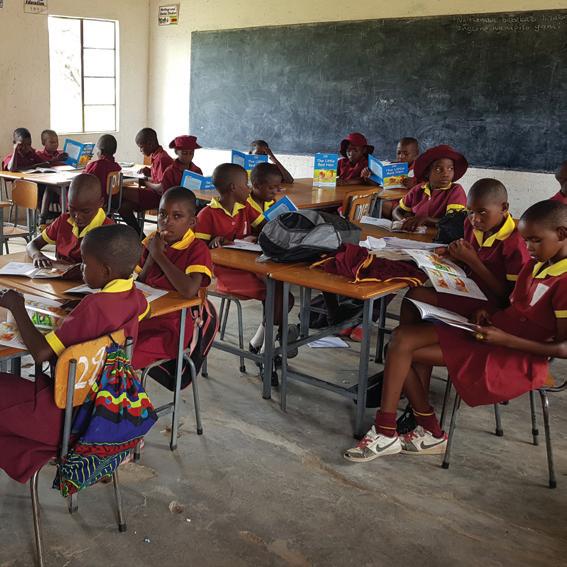
2 minute read
Humans of Carey: Gillian Scott
Middle School Teacher
In Zimbabwe, a country usually associated with stories of economic collapse, there is a common saying when faced with a challenge: ‘We will make a plan’. In January, I witnessed acts of great determination and kindness that really are making a difference. I travelled there to work with the Hwange Schools Project. Its primary mission is to improve literacy in a cluster of schools in a rural area that borders the Hwange National Park.
Far from the capital, Harare, these remote communal lands sit just a flimsy fence away from one of the largest populations of African elephants, with numbers as high as 35,000. The fences are there to keep the people out of the park – not the elephants in! Understandably, one of the biggest threats to these animals is poaching. The CAMPFIRE initiative in Zimbabwe aims to create a direct linkage of benefits to these communities from wildlife conservation, supported by a network of ecotourism operators in and around the parks. One of these, Imvelo, assists the Project. Having identified a need for high school teachers to have a separate workshop, I wasfortunate to be invited to facilitate this through my sister, a primary educator and volunteer. I am a secondary teacher of English and Literature, and have worked at Carey since 2015.
There are many barriers that stand in the way of receiving a full primary education, let alone secondary education, for a child in rural Zimbabwe. All children must be taught in English and exams are taken in English, including at the end of primary school and Year 10 equivalent. The local language around Hwange is Ndebele, however, and children have very little exposure to English compared with those in urban areas. Although education is ‘free’, the cost of registration, books and basic stationery can be prohibitive for parents. The members of the project have produced English language picture books featuring stories the local kids can relate to, with a young adult novel and grammar text in the pipeline. They support many other projects, including the purchasing of textbooks, and rely on a fundraising and volunteer network that stretches around the world as people visit on safari and witness the need.
A Zimbabwean by birth, I had last visited in the mid-1990s. It is a country of extremes – incredibly beautiful and teeming with wildlife, but also experiencing devastating poverty and prolonged drought, which means survival for many is precarious. I am grateful to have been able to hand over a generous donation from the Carey community, knowing it would be put to immediate use to purchase school furniture.
When working with the project, I had to quickly learn about the Zimbabwean education system, sharing many teaching and learning strategies with a hands-on focus due to the limited access to technology and resources. The warmth and generosity of Zimbabweans is exceptional. The teachers in my workshop certainly humoured me by taking part in all our activities, as we ‘made a plan’ in our stifling, termite-infested classroom, writing on blackboards and butcher’s paper, listening to the cattle passing outside the windows, working on our common goal. The work of the project means so much to me as an educator, and although travel is unlikely in 2021, I will definitely be making a plan to return in the future.











